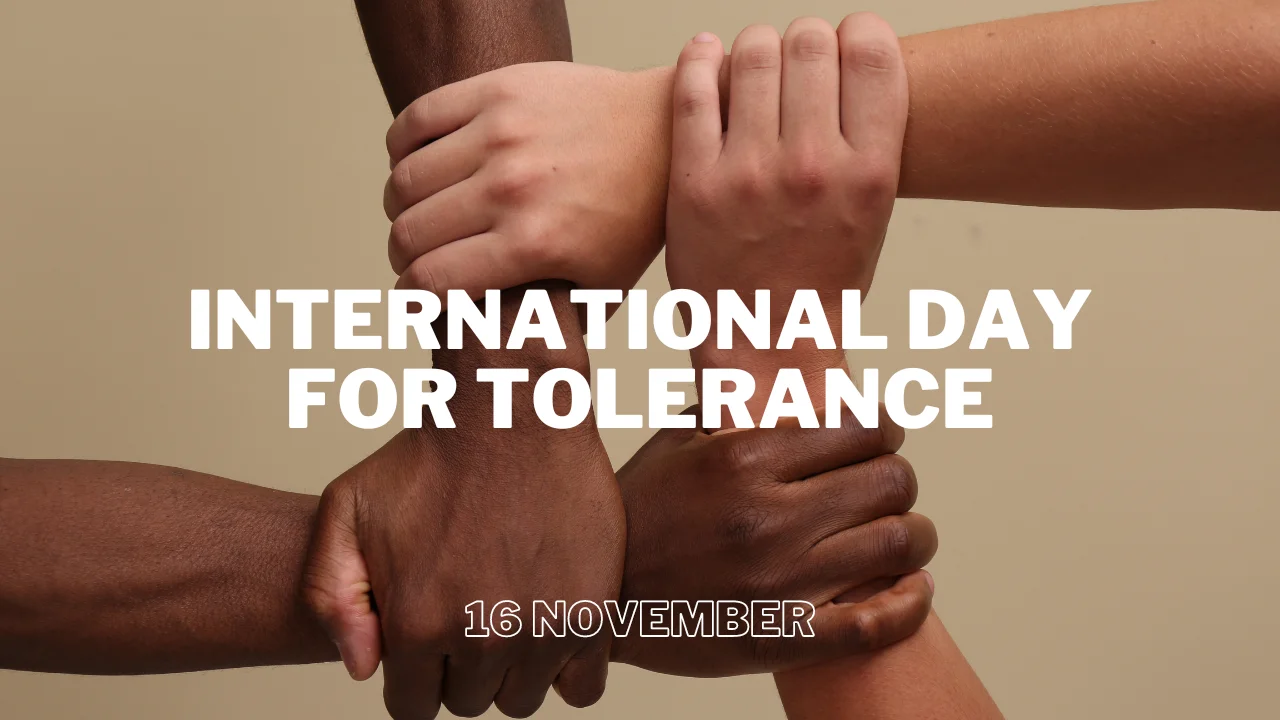International Day for Tolerance 2024
International Day for Tolerance is celebrated annually on November 16th to promote and raise awareness of tolerance, respect, and understanding for people of all backgrounds and cultures. It is a day to reaffirm the principles of human rights and equality and to encourage open-mindedness, empathy, and compassion.
International Day for Tolerance Theme 2024
As of today, the theme for International Day for Tolerance 2024 has not been announced yet.
The theme in 2023 was “Tolerance: A Path to Peace and Reconciliation”. This theme underscores the crucial role of tolerance in building peaceful and inclusive societies. It highlights the need to address the root causes of intolerance, such as prejudice, discrimination, and stereotyping, and to promote understanding, empathy, and dialogue.
History of International Day for Tolerance
The history of International Day for Tolerance dates back to 1995 when the United Nations General Assembly adopted Resolution 51/95 proclaiming November 16th as International Day for Tolerance. This decision was taken following the adoption of a Declaration of Principles on Tolerance by UNESCO’s Member States on the same day.
The Declaration of Principles on Tolerance
The Declaration of Principles on Tolerance outlines the fundamental principles that underpin a tolerant society. It emphasizes that tolerance is not simply passive acceptance of others but an active commitment to understanding, respecting, and appreciating diversity. The Declaration also highlights the importance of promoting tolerance through education, dialogue, and legal protections.
Establishment of International Day for Tolerance
In light of the Declaration of Principles on Tolerance, the UN General Assembly recognized the need for a dedicated day to raise awareness of the importance of tolerance and promote its practice worldwide. November 16th was chosen as the date for International Day for Tolerance, coinciding with the anniversary of UNESCO’s adoption of the Declaration.
Objectives
The primary objectives of International Day for Tolerance include:
- Promoting awareness of tolerance and its significance in fostering peaceful and inclusive societies.
- Encouraging open-mindedness, empathy, and compassion towards people of all backgrounds and cultures.
- Educating the public about the dangers of intolerance, discrimination, and prejudice.
- Reaffirming the principles of human rights and equality for all.
A Catalyst for Change
Since its inception, International Day for Tolerance has catalyzed promoting tolerance and combating intolerance worldwide. It has inspired educational initiatives, community dialogue programs, and advocacy campaigns for human rights and equality. The day has also fostered international cooperation and collaboration in addressing global challenges related to intolerance and discrimination.
The Path Ahead
As the world continues to grapple with issues of diversity, inclusion, and social justice, International Day for Tolerance remains a crucial reminder of the importance of cultivating tolerance in our daily lives and promoting it as a cornerstone of peaceful and harmonious societies. By embracing tolerance, we can foster understanding, build bridges between cultures, and create a more just and equitable world for all.
Significance of International Day for Tolerance
In a world increasingly characterized by diversity, tolerance is essential for fostering peaceful coexistence, preventing discrimination, and promoting social harmony. Tolerance is not merely the acceptance of differences; it is an active commitment to understanding, respecting, and appreciating the unique values, perspectives, and beliefs of others.
UNESCO-Madanjeet Singh Prize for the Promotion of Tolerance and Non-Violence
In 1995, to commemorate the United Nations Year for Tolerance and the 125th anniversary of Mahatma Gandhi’s birth, UNESCO established the UNESCO-Madanjeet Singh Prize. This prestigious award recognizes noteworthy initiatives in the scientific, artistic, cultural, or communication domains dedicated to fostering a spirit of tolerance and non-violence. The Prize is inspired by the principles of UNESCO’s Constitution, which emphasizes that “peace, to be sustainable, must be built on the intellectual and moral solidarity of humanity.”
Who was Madanjeet Singh
Madanjeet Singh, born on 16 April 1924 in Lahore (present-day Pakistan), achieved international recognition as an author of several books on art and various subjects closely aligned with UNESCO’s programs, principles, and ideals. His diplomatic service included roles as the Ambassador of India in Asia, South America, Africa, and Europe.
In 1995, acknowledging his lifelong commitment to communal harmony and peace, the UNESCO Executive Board unanimously established the biennial “UNESCO-Madanjeet Singh Prize for the Promotion of Tolerance and Non-Violence.” This decision was made during meetings in Paris and Fez (May 16 to June 4), commemorating the 125th birth anniversary of Mahatma Gandhi.
In the year 2000, Madanjeet Singh founded the South Asia Foundation (SAF) to advance sustainable cultural, educational, and economic development across the region.
Recognizing his generosity and tireless efforts in promoting these noble objectives, aligned with UNESCO’s mission, Madanjeet Singh was appointed as a UNESCO Goodwill Ambassador on 16 November 2000.
16th November 2024 Special Day
On November 16, the International Day for Tolerance is observed to advocate and heighten awareness of tolerance, respect, and understanding across diverse backgrounds and cultures. This day serves as a reminder to uphold human rights and equality principles while fostering open-mindedness, empathy, and compassion. In 2024, let’s celebrate and actively promote a world where tolerance flourishes, bridging gaps and fostering harmony among individuals of varied perspectives and backgrounds.
- Daily Current Affairs 2024, Check Today’s Current Affairs
- Weekly Current Affairs 2024, Download Free PDF
- Banking Current Affairs 2024, Download PDF
- Monthly Current Affairs for SSC 2024, Download Free PDF
- World Migratory Bird Day 2024, Theme, History & Significance
- National Technology Day 2024, Its History, Facts & Significance

Oliveboard Live Courses & Mock Test Series
- Download IFSCA Grade A PYQs
- Download SEBI Grade A PYQs
- Download SEBI Grade A 300+ MCQs
- Download 500+ Free Ebooks for Govt. Exams Preparations
- Attempt Free SSC CGL Mock Test 2024
- Attempt Free IBPS Mock Test 2024
- Attempt Free SSC CHSL Mock Test 2024
- Download Oliveboard App
- Follow Us on Google News for Latest Update
- Join Telegram Group for Latest Govt Jobs Update







